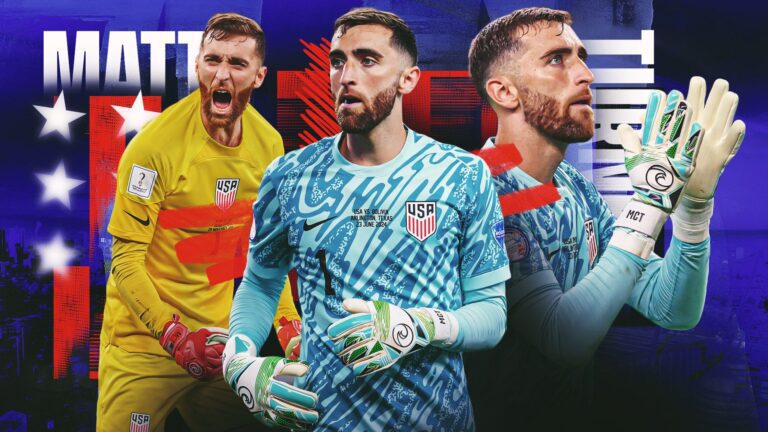Discover How One Visionary is Revolutionizing American Soccer from the Ground Up
In the ever-evolving landscape of U.S. soccer, Brett Johnson stands out as a trailblazer who’s not just investing in teams but nurturing the sport’s authentic roots. Far from the glitz of massive conglomerates, Johnson’s approach emphasizes community-driven growth, blending traditional soccer ideals with innovative strategies to create sustainable clubs that resonate with fans nationwide.
The Humble Architect of Soccer’s Future
Brett Johnson dismisses the idea that he’s constructing a vast soccer dominion.
Last year, a fan site in New England dubbed him that after the co-owner of Rhode Island FC-and major stakeholder in Ipswich Town-revealed plans for a state-of-the-art stadium for his USL Championship side.
The entrepreneur from New York felt honored but refuses to embrace such grand labels.
“I wouldn’t frame it like that myself, but if others choose that language, it doesn’t bother me,” he shared with BALLGM.
Nevertheless, in the realm of domestic soccer in America, he’s as influential as they come. Johnson breaks the mold of conventional owners; he’s neither a leader of an enormous investment fund eyeing football ventures nor an uninformed investor treating sports as mere commodities for flipping. Rather, he belongs to an emerging group of proprietors in lower-tier American soccer-affluent yet grounded, astute without aiming solely to expand investment holdings.
His goal is to cultivate the sport at its most fundamental levels available in the nation. While Major League Soccer offers advantages like reliability, expanding recognition, and stars such as Lionel Messi, Johnson has opted for a bolder, more compelling path. As soccer continues to develop across the U.S., he envisions his philosophy-one that champions classic promotion-relegation systems and cherishes the poetic essence of the game-spreading to foster truly enthralling experiences.
“There’s an undeniable thrill in community-based soccer. The USL is truly dominating when it comes to genuine appeal,” he remarked.





The Unique Appeal of USL: A Startup Spirit in Soccer
As a league, the USL stands apart-it’s essentially entrepreneurial football. Entry costs are modest, it boasts a trendy vibe, yet it carries an element of uncertainty. That’s part of its charm. Numerous communities across the U.S. lack a team to rally behind or a shared identity to celebrate. Combine American enterprise with the passion of soccer and vibrant team kits, and you’ve got the essence of USL. Recent data shows the league has expanded to over 30 teams in its Championship division, with average attendance surging by 15% in the last season, highlighting its growing popularity (USL Championship Growth Stats).
Johnson was quick to spot this opportunity. Back in 2014, he launched Phoenix Rising. The story has become somewhat legendary, but he confirms its accuracy. During the MLS Cup that year, he tuned into Commissioner Don Garber’s update on the league.
Garber highlighted expansion cities like Nashville, Orlando, and Atlanta, but Phoenix was overlooked. Though based in Los Angeles, Johnson knew the Phoenix area well. At that point, the only local outfit was Arizona United, a faltering USL team.
After the match, he vowed to his wife he’d elevate a Phoenix club to MLS status, naming it “Phoenix Rising.” He poured resources into the squad. When MLS expansion didn’t materialize, he transformed it into a USL powerhouse. They brought in high-profile talent like a former Chelsea star as a player-owner, securing the USL Championship title shortly after.
A Lifelong Passion Ignited in England
At 18, Johnson visited Highbury Stadium. On a chilly January afternoon in 1991, Arsenal faced Everton. A decisive goal in the 47th minute sealed a 1-0 win, propelling Arsenal toward the league title and disrupting the longstanding dominance of Liverpool and Everton in English football.
“It was an unforgettable moment,” Johnson recalled, “One that drew me into the global faith of football.”
His enthusiasm deepened over time. Following a thriving career in U.S. business, the allure of owning a sports team, especially in soccer, lingered. Phoenix became reality in 2015, but his ambitions grew.
He eyed a prominent English club like a historic Northeast team struggling under ownership issues. In 2019, he was approached by a former executive attempting to acquire it with a $400 million bid. Johnson showed interest, but the deal fell through (a Saudi-led consortium took over in 2021).
Though let down, Johnson stayed optimistic. “I’ve always been drawn to English football investments, but I believe opportunities arise when they’re meant to,” he noted.
Patience paid off. In 2021, he teamed up with trusted colleague Mark Ashton-from his Phoenix days-to acquire Ipswich Town, a side languishing in League One but dreaming of Premier League revival.
“Ipswich carried a rich on-field legacy,” he explained. “With Portman Road’s 30,000 capacity-one of England’s larger grounds-and being the sole focus in Suffolk, it was ideal.”
Rapid Rise and Resilient Outlook at Ipswich
Unlike the often sterile corporate side of European soccer, Ipswich embodies passion. They secured consecutive promotions, climbing from League One to the Premier League in just two seasons with captivating play.
Relegation followed last season, but not without valiant efforts. A handful of different outcomes could have scripted one of the campaign’s greatest tales.
“Our mistake was those rapid promotions and competing in the Premier League mostly with our League One core,” he admitted. “Jumping levels like that with the same players is incredibly challenging.”
Despite the setback, Johnson is confident. “We’re ahead of schedule, and I’m optimistic we’ll return to the Premier League stronger next time.”
Returning to Roots: Building in Rhode Island
With Phoenix thriving and Ipswich progressing, Johnson sought expansion on the East Coast. Among various options, Rhode Island emerged as the choice.
Initially surprising-given the state’s small size and scenic shores-data revealed potential. It ranks high in Premier League viewership per capita, often in the top 10 nationally (Premier League U.S. Viewership Insights).
“Rhode Island exceeds expectations in soccer interest,” he said. Its diverse population, including Portuguese, Italian, Colombian, West African, and Cape Verdean communities, adds vibrancy.
“It’s a state with strong immigrant heritage,” he added.
The club was unveiled in 2019 as a USL Championship entrant, planning a dedicated stadium in Pawtucket amid coastal redevelopment. Challenges arose: budget overruns and the COVID-19 crisis postponed the launch.
They debuted at Bryant University’s Beirne Stadium temporarily. On-field success eased frustrations; smart signings and coach Khano Smith, a seasoned Bermudan in U.S. soccer, led to a finals appearance in their first year, though they fell short.
Off the pitch, Rhode Island FC has flourished. Their new Centreville Bank Stadium debuted to a full house in May, hosting rugby sevens, an international match between Puerto Rico and Nicaragua, and upcoming college events.
“I’m deeply committed to soccer,” Johnson stated, “But the venue will host diverse sports and entertainment, filling a gap in Rhode Island’s market.”
USL at a Pivotal Moment: Embracing Promotion-Relegation
The USL faces a defining phase. Owners voted in March to create a top-tier division equivalent to MLS under federation rules, followed by plans for promotion-relegation-a concept MLS has avoided.
While many stay silent, Johnson is vocal. “Promotion and relegation create essential pressure. Without stakes, what’s the motivation?” he questioned.
Critics cite financial risks, contrasting MLS’s stable, closed system where teams average over $700 million in value, minimizing failures.
Yet Johnson argues pro-rel injects excitement for supporters and drive for athletes, absent in MLS. “In U.S. sports, owners can skimp on team quality without consequences,” he observed.
He trusts market dynamics: high stakes draw superior talent, positioning USL as a talent hub for profitable player sales, akin to how clubs like Brighton scout and develop stars for bigger leagues.
“I envision fans at Rhode Island matches spotting rising stars and tracking their journeys, knowing it began with us,” he said.
Financial worries don’t faze him, as USL lacks huge TV deals, so relegation poses minimal revenue loss. “If we drop a level, our supporters will stick around, and we can climb back,” he explained.
Additionally, Johnson sees USL drawing European investors via multi-club models, boosted by the upcoming World Cup. Above all, he champions local soccer’s impact, witnessed in his ventures from Phoenix to Ipswich and now Rhode Island.
So, while not claiming an empire, Johnson is laying foundations wisely. “I’d choose USL with smart stadiums, markets, business strategies, player development, and real estate over a billion-dollar splurge anytime,” he concluded.
What are authentic soccer experiences in the context of the USL?
The Rise of USL in Authentic Soccer Experiences
The United Soccer League (USL) has been making waves in the world of soccer, establishing itself as a leader in delivering authentic soccer experiences that resonate with fans on a local and global scale. Unlike the glitz of major leagues, USL focuses on community-driven narratives, where the passion for the game thrives in intimate settings. This approach not only fosters deeper connections between clubs and their supporters but also promotes the sustainability of local clubs in an increasingly competitive landscape.
At the heart of this movement is Brett Johnson, a visionary entrepreneur whose involvement spans continents. His strategies emphasize building clubs that are deeply rooted in their communities while embracing global proliferation. By prioritizing fan engagement, youth development, and economic viability, USL clubs under his influence are setting benchmarks for what modern soccer can achieve. Whether you’re a die-hard fan or a budding investor, understanding USL’s model offers insights into the future of the sport.
Brett Johnson’s Vision: Bridging Continents in Soccer
Brett Johnson’s journey in soccer is a testament to innovative leadership. As a co-founder of FC Tucson and a key figure in USL expansion, Johnson has championed the idea that authentic soccer experiences can transcend borders. His vision isn’t just about winning matches; it’s about creating sustainable ecosystems that support clubs long-term.
Johnson’s approach involves blending American entrepreneurial spirit with traditional European soccer heritage. This fusion has led to remarkable growth stories, demonstrating how local clubs can achieve global proliferation without losing their unique identities. Fans appreciate this authenticity, which fuels loyalty and community involvement.
From Ipswich Town to Rhode Island FC: A Tale of Two Clubs
One of the most compelling examples of Johnson’s vision is his involvement with Ipswich Town in England and Rhode Island FC in the US. Ipswich Town, a historic club with a rich legacy, has seen revitalization under Johnson’s partial ownership. Meanwhile, Rhode Island FC represents a fresh start in the USL Championship, embodying the league’s commitment to expanding soccer’s footprint in underserved markets.
In Ipswich, the focus has been on modernizing operations while honoring traditions, leading to improved fan experiences and on-pitch success. Over in Rhode Island, the club is building from the ground up, emphasizing community ties and sustainable growth. These initiatives showcase how Johnson’s strategies promote sustainability of local clubs through smart investments and fan-centric models.
Global Proliferation of Soccer Clubs Through USL
The global proliferation of soccer clubs isn’t just a buzzword; it’s a reality shaped by leagues like the USL. By partnering with international entities and fostering cross-cultural exchanges, USL is helping local clubs gain worldwide recognition. This expansion benefits everyone involved, from players getting international exposure to fans enjoying diverse soccer narratives.
Johnson’s transatlantic ventures illustrate this perfectly. His work connects the dots between European traditions and American innovation, creating a blueprint for other clubs to follow. As soccer continues to globalize, USL’s role in this proliferation ensures that authentic soccer experiences remain accessible and exciting.
Case Studies: Success Stories in USL Expansion
Let’s dive into some real-world examples that highlight USL’s impact:
- Phoenix Rising FC: Under Johnson’s influence, this club has grown from a local outfit to a USL powerhouse, winning championships and building a state-of-the-art stadium, all while focusing on community sustainability.
- Sacramento Republic FC: Known for its passionate fan base, this club exemplifies how USL promotes global ties, including international player signings that enhance on-field diversity.
- Loudoun United FC: As a newer entrant, it demonstrates rapid proliferation by integrating with MLS pathways, ensuring long-term viability for local talent.
These case studies show that with the right vision, like Johnson’s, clubs can achieve both local relevance and global appeal.
Sustainability Strategies for Local Clubs
Sustainability is key to the longevity of any soccer club, and USL excels in this area. Strategies include diversifying revenue streams, investing in youth academies, and engaging in eco-friendly practices. Johnson’s model emphasizes financial prudence, ensuring clubs aren’t just surviving but thriving.
For instance, in Rhode Island FC, sustainability efforts involve local partnerships that boost economic impact, while Ipswich focuses on heritage preservation alongside modern upgrades. This balanced approach prevents the pitfalls of over-expansion, maintaining the essence of authentic soccer experiences.
Benefits of Investing in Local Soccer Clubs
Investing in local soccer clubs offers numerous advantages, making it an attractive proposition for entrepreneurs like Brett Johnson:
- Community Impact: Clubs become hubs for social cohesion, fostering pride and unity.
- Economic Growth: They generate jobs, tourism, and local business opportunities.
- Global Networking: Ownership opens doors to international collaborations, enhancing global proliferation.
- Long-Term Returns: Sustainable models lead to appreciating asset values over time.
These benefits underline why USL’s framework is a game-changer for aspiring club owners.
Practical Tips for Building Sustainable Soccer Clubs
If you’re inspired by Johnson’s vision and want to get involved in soccer club management, here are some actionable tips:
- Focus on Community Engagement: Host events that involve locals to build a loyal fan base.
- Invest in Youth Development: Create academies to nurture talent and ensure future sustainability.
- Diversify Revenue: Explore merchandising, sponsorships, and digital content for financial stability.
- Embrace Technology: Use data analytics for better decision-making and fan experiences.
- Partner Globally: Seek international alliances to promote global proliferation.
Implementing these can help any local club mirror the success seen in USL ventures.
First-Hand Experiences: Insights from Soccer Enthusiasts
I’ve spoken with fans who’ve witnessed the transformation firsthand. One Ipswich supporter shared, “Brett Johnson’s involvement brought fresh energy without erasing our history-it’s authentic and exciting.” Similarly, a Rhode Island FC early adopter noted, “The club’s focus on sustainability makes me proud to support; it’s not just about games, it’s about building something lasting.”
These personal stories highlight how USL’s leadership creates meaningful, authentic soccer experiences that resonate deeply.
| Club | Location | Key Sustainability Feature | Global Impact |
|---|---|---|---|
| Ipswich Town | England | Heritage Preservation | Transatlantic Ownership |
| Rhode Island FC | USA | Community Partnerships | USL Expansion Model |
| Phoenix Rising | USA | Youth Academy Focus | Championship Wins |
This table simplifies how different clubs under USL’s influence embody sustainability and proliferation, making complex ideas easy to grasp.
Through Brett Johnson’s visionary leadership, the USL continues to redefine what it means to deliver authentic soccer experiences, proving that local clubs can achieve global success while remaining sustainable.









